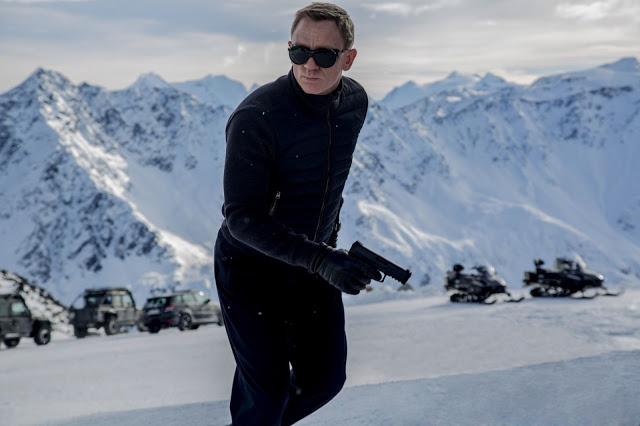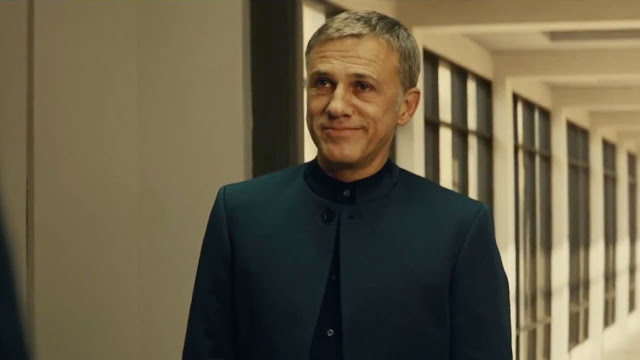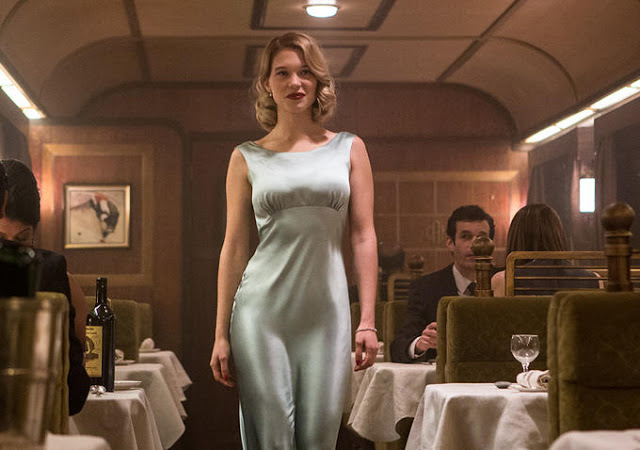James Bond may be a spy, but he’s also a known quantity. Britain’s most daring and debonair secret agent has been gliding cavalierly across movie screens for the past half-century, consistently dazzling us with his savvy and his pluck, even as we have grown accustomed to his nonchalant displays of implausible superheroism. The sheer volume of the Bond canon—23 films, some inevitably better than others, but all adhering more or less to the same basic template—makes the prospect of a new film featuring Agent 007 both challenging and liberating. It is difficult by now to impress us, we who have watched Bond consistently outfight and outwit his foes, whether via car or plane or parachute. But familiarity can breed opportunity as well as contempt, and recent Bond pictures have illustrated the franchise’s capacity for growth, even as they have dutifully paid homage to their forebears.
Spectre, the fourth James Bond movie to star Daniel Craig (and the second directed by Sam Mendes, following his superb Skyfall), is both the most traditional and the most ambitious of his quartet. It conforms to the established formula with jovial style, bombarding us with outlandish action sequences, beautiful women, luxury cars, and exotic locations. But it also attempts to serve as a conclusion of sorts, a culmination of the franchise rebooting cultivated by the first three Craig-led pictures. The aspiration may be admirable, but the results are decidedly less so. As a classic Bond movie, Spectre is perfectly adequate, a collection of reasonably impressive moments that do little to distinguish themselves from prior entries. But as a piece of serialized storytelling, it is startlingly misguided, a poorly judged attempt to retcon the previous films into the building blocks of a larger scheme. Spectre raises itself up as the Big Bad, but it really just brings the Craig era to its low point.
That is not an overly cutting putdown, relatively speaking. Two of Craig’s earlier movies—Skyfall and especially Casino Royale—are marvels of modern action filmmaking, robust works of unadulterated entertainment that also throb with tension and danger. (The middle installment, Quantum of Solace, has its problems but also its underrated virtues.) And if nothing else, Spectre ably advances the franchise’s newfound commitment to visual artistry, further proof that genre flicks are perfectly compatible with true craft. Consider the film’s showstopping opening shot. Set first on the clamoring streets of a Mexico City parade, the camera (operated by Hoyte Van Hoytema, the cinematographer on both Interstellar and Her) drifts through a throng of darkly clothed celebrators until it finds a masked man in an ice-cream-white suit; it follows him for a time before it grows restless and drifts to another masked man, this one clearly eyeing the first figure the way a cat stalks a mouse. The predator, of course, is Bond, James Bond, and the camera can’t help but gawk at him as it follows him indoors, up an elevator with a striking female companion (Stephanie Sigman, from Netflix’s Narcos), then back out into the bright Mexican sun as he clambers across a rooftop. It’s a ravishing single-shot opening, a bracing reminder that even if Mendes is finally letting loose outside the art house, he still takes his work seriously.
Seriousness has always been Craig’s M.O.; despite his lighter hair, his Bond runs a touch darker than past incarnations, hinting at the metaphysical weight underlying 007’s repeated dances with death. He lightens things up considerably this go-round, an understandable approach—excessive dourness would flatten the character—that nevertheless suggests, for the first time, that he’s going through the motions. It also results in a tonal inconsistency, as a significant subplot of Spectre revolves around Bond’s murky childhood (a theme explored more effectively in Skyfall). In general, the screenwriters—including Skyfall‘s troika of Neal Purvis, Robert Wade, and John Logan, along with Edge of Tomorrow co-writer Jez Butterworth—are busy bees, continuously trying to retrofit the Bond mythology while simultaneously honoring it. There’s even a pronounced political subtext to one narrative strand, which involves a snake-oil bureaucrat named C (Sherlock‘s Andrew Scott) attempting to institute a coordinated global surveillance program that would make the NSA jealous. C deems MI6’s “00” program, with its high-powered weaponry and old-school fieldwork, to be a relic from a bygone era. This is, of course, a patently wrong opinion, one that marks C as a threat to Bond’s beleaguered boss, M (Ralph Fiennes, solid but lacking the spark of Judi Dench), not to mention as an object of derision for any self-respecting fan of spy-soaked cinema.
There is a whiff of topicality to this concept, but it’s largely peripheral. The meat of Spectre involves Bond’s unauthorized investigation into the shadowy criminal organization that gives the movie its title. After some welcome banter with Q (a very fine Ben Whishaw) and some standard do-you-trust-me? rhetoric with Moneypenny (an underserved Naomie Harris), Bond heads to Rome, searching for an underworld figure known as the Pale King. (Presumably, the screenwriters are fans of the late David Foster Wallace.) And here, surrounded by the timeless beauty of Italy, Spectre does its best work. Bond first encounters a grieving widow (Monica Bellucci, nicely cast) who shares an enemy with our favorite rogue agent, leading to a gorgeous moment where Mendes places Bellucci in the center of the frame and simply watches as two assassins emerge from the background, guns drawn, only to be quickly foiled. Better yet is the terrific introduction of Spectre itself, the kind of extravagantly officious enterprise whose members meet in an abandoned castle and seat themselves at a table that seems to be a half-mile long. That table is headed by a terrifying, black-hearted man named Franz Oberhauser (Christoph Waltz); when we first meet him, he spends virtually the entire scene hidden in shadow, effortlessly dominating the room while saying absolutely nothing.
That is a marvelous introduction to the chief villain of a Bond film, but it’s gradually revealed to be a mirage. Oberhauser—he has another name, one Bond fans can probably guess once a fluffy white cat shows up—is purported to be some sort of devious mastermind, yet Waltz’s performance is all insinuation, no payoff. The Austrian actor has been destined to play a Bond baddie ever since he ignited the screen six years ago in Inglourious Basterds, but he has a paltry amount of screen time here, and in the few moments where he takes center stage, he fails to differentiate himself from the franchise’s typical megalomaniac. Waltz is a magician with dialogue—words turn to jewels in his mouth—so it’s mystifying that his most effective scene is the one where he doesn’t talk.
Waltz’s lack of pop is a critical problem, because the central conceit of Spectre—its entire narrative foundation, really—is that Oberhauser has been manipulating Bond ever since Daniel Craig obtained his license to kill. We learn, through a surfeit of exposition, that the de-facto villains of the past three films were mere placeholders, peons acting in accordance with Oberhauser’s grand, evil conspiracy. This kind of retcon is a dubious proposition generally, and it’s even more suspect in the context of James Bond specifically; one of the pleasures of the series is that its installments are self-referential but also self-contained, dispensing with the tedious obligation of franchise world-building. Still, it’s arguably a bold move by the writers (as is the dangerous decision to insistently evoke memories of Vesper Lynd, the all-time-great Bond girl played by Eva Green in Casino Royale), and one can envision a scenario where Spectre stands as the magnum opus of Craig’s Bond career, the film that reshapes our understanding of the actor and the character.
That’s plausible in theory, but for the gambit to work, the movie has to be legitimately great. And Spectre just isn’t good enough. There is an alarming lack of urgency to its storytelling, a sense that it’s marking time, waiting for something interesting to happen. The cognitive dissonance is jarring; the movie repeatedly tells us how sweeping it is in its scope and vision, yet it’s a strangely impersonal experience, one that feels completely bereft of stakes. Spectre hopscotches through the usual Bond formula, hitting all of the standard beats, but where familiarity in a Bond film is often soothing, here it feels perfunctory. “It’s not over yet,” Bond intones solemnly at one point, and the statement is doubly damning: It underscores both how little impact the movie has made and how much more we have to trudge through.
This is unfortunate, because if you can ignore Spectre‘s persistent proclamations of its own grandeur—and if you can disregard its particularly limp final act—it works fairly well as a punchy, unassuming Bond film. Blue Is the Warmest Color‘s Léa Seydoux plays the requisite Bond girl, and while her romantic chemistry with 007 isn’t nearly as electric as the movie claims, she still manages to project frailty and fearlessness at once, a beauty with a brain. (Mendes isn’t shy about exploiting her looks; a single shot of Seydoux sashaying down an aisle in an aquamarine dress is infinitely more heart-pounding than an interminable, leaden sequence in which Bond uses a biplane as a battering ram while pursuing a trio of automobiles through the Austrian Alps.) Dave Bautista, who rocketed to fame as Drax in Guardians of the Galaxy, is a suitably glowering henchman, the type who never speaks but whose stature and demeanor exude menace. A hand-to-hand combat sequence on a train is appropriately kinetic (and is noteworthy for its initial lack of music), and there’s also a fairly thrilling car chase (Aston Martin alert!) alongside the Tiber that playfully subverts the franchise’s historical overreliance on ludicrous gadgets. This is all fun stuff, but its impact is diluted by Spectre‘s relentless agenda, and its insistence that it is an epic Bond film betrays a baffling lack of self-awareness.
Prior to that aforementioned, glorious opening shot, Spectre begins with an ominous title card: “The dead are alive.” This theme—of resurrection, of past figures returning to life to disturb the present—comes to dominate the film, but not in the way Mendes intends. He wants the movie to operate as the franchise’s apex, but in continually harking back to Bond pictures of yesteryear, he merely proves this one’s inferiority, highlighting its constant cannibalism. At one point, Oberhauser forces 007 to stroll through a corridor adorned with giant portraits of recent Bond villains—Mads Mikkelsen, Mathieu Amalric, Javier Bardem—who were all significantly better than Waltz, and the irony is too much to bear. The same is true of the film’s title. Hardcore Bond fans may recognize “Spectre” as an acronym for a mealymouthed organization conceived by Ian Fleming (“Special Executive for Counterintelligence, Terrorism, Revenge and Extortion”), but the word’s more common definition—phantasm—is far more fitting. Rarely has a movie been so haunted by its own ghosts.
Jeremy Beck is the editor-in-chief of MovieManifesto. He watches more movies and television than he probably should.



